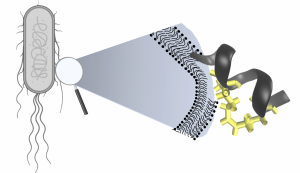
Development of effective antibacterial compounds by stabilising the structures of peptides penetrating biological membranes
Some peptides are an important part of the organism defense system, as they have antimicrobial activity. Due to high activity, specificity and lack of interactions with other drugs, naturally occurring peptides and their synthetic analogs are attractive compounds of therapeutic interest. Unfortunately, most peptides are unstable in the environment of the cell, so few have found application in medical practice. The goal of the project is to obtain new synthetic peptides with antimicrobial activity that are stable in the intracellular environment but not toxic to human cells. The compounds are designed on the basis of peptides that interact with cell membranes. The introduction of a chemical “staple” to the peptide sequence is expected to stabilize the active structure of the peptides, enhance their destructive effect on bacterial walls and increase biostability.
The aim of the project is to design and synthesize series of “stapled” peptides based on peptide sequences that transport other molecules into the bacterial interior. Our preliminary studies have shown that properly selected amino acid sequences and “staple” insertion sites can lead to peptides that inhibit bacterial growth at concentrations similar to conventional antibiotics. All synthesized peptides are being characterized for their antibacterial activity (including against strains resistant to existing antibiotics), intracellular stability and hemolytic activity.
Principal Investigator: prof. dr hab. Joanna Trylska, CeNT UW
Project period: Nov 1, 2022 – Feb 28, 2023
Funding: “Excellence Initiative – Research University (2020-2026)”, a programme of the Ministry of Science and Higher Education


